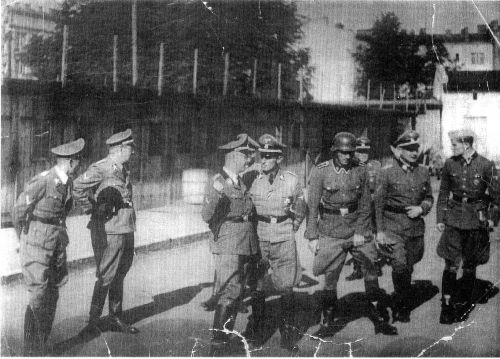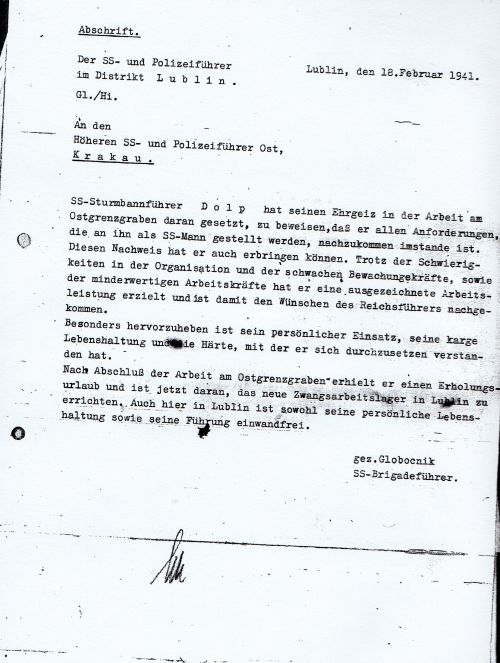Hermann Dolp
Hermann Dolp was born on September 12, 1889, in Turkheim, Bavaria.After service in the Great War, he joined one of the many right-wing para-military Freikorps units active in Bavaria and he became one of the initial SA street- fighters loyal to the cause of Adolf Hitler and National Socialists ideals. He served time in prison for beating up political opponents. In November 1923, he took part in the Beer Hall Putsch, in Munich.
He joined the National Socialist Party in 1928, and a year later in October 1929, joined the SS, as an unpaid Untersturmfuhrer. His SS Number was 1293. In September 1930, he was promoted to the rank of SS-Standartenfuhrer, commanding Adolf Hitler's protection squad in Munich. In late 1933, he was sent to assist with the construction and development of Dachau Concentration Camp and he remained there through the summer of 1934. From January 1935 onward, he served in the SS Headquarters in Berlin, and in August 1939, he was sent to Sachsenhausen Concentration Camp, near Berlin, as garrison commander.
Hermann Dolp was married and the father of four children. He was a good organiser, although not known for his intellect. He developed a weakness for alcohol, which he consumed in great quantities.
After the German occupation of Poland in September 1939, Dolp was given command of local ethnic German para-military units and then headed the Gestapo in Kalisz, in the Warthegau. It was here that his drinking got him into serious trouble. On November 1, 1939, he was caught drunk trying to rape a young Polish woman, who happened to be the girlfriend of another German official. The case was investigated on the order of the Inspector of Concentration Camps, Theodor Eicke, and Dolp was arrested on January 9, 1940.
He was tried before an SS court on February 4, 1940, found guilty and demoted in rank. He was demoted to the rank of SS-Sturmbannfuhrer and forbidden from drinking alcohol for two years. On February 8, 1940, Reichsfuhrer-SS Heinrich Himmler wrote to Hermann Dolp pointing out that any disregarding of the alcohol ban would result in him being drummed out of the SS.
By mid-February 1940, Dolp was transferred to the command of SS-Polizeifuhrer Lublin, under Odilo Globocnik. One of Dolp's first tasks was to accompany a march of Jewish forced labourers to work in the city of Biala Podlaska, during which hundreds of Jews died. Globocnik then placed Dolp in charge of organising the establishment of a labour camp on Lipowa Street in Lublin.

Himmler visits the Lipowa Street Camp in Lublin (Holocaust Historical Society)
In the late spring of 1940, Globocnik sent Hermann Dolp to supervise the construction of trench work, known as the 'Otto Line' along the border with the Soviet-occupied part of Poland. Dolp set up a number of labour camps in the village of Belzec, and surrounding area. Herman Dolp was keen to redeem his reputation, and he threw himself into this task with zeal, and he saw that his orders were carried out ruthlessly. At Belzec he was assisted by Franz Bartezko. Dolp was infamous for his cruelty, and sadism toward the prisoners. He was also well-known for his corrupt conduct. Prisoners who were assigned to produce clothes and shoes in the workshops, Dolp proceeded to sell them on the black market.

Letter to Kruger HSSPF Ost from Globocnik about Dolp (NARA)
After the German attack on the Soviet Union in June 1941, Odilo Globocnik sent Hermann Dolp to act as his representative to Minsk and Mogilew, working on the construction of SS and Police bases. Globocnik had been appointed by Heinrich Himmler on July 17, 1941, as his Plenipotentiary for the Construction of SS and Police bases in the newly occupied Eastern areas of the Soviet Union. He remained in the Soviet Union until May 1942, to Norway. Dolp was commandant of a Prisoner of War camp at Osen-Elsfjiord and he also was in charge of various forced labour camps.
From August 1943, until February 1944, he was posted to the SS Headquarters in Berlin, when he was subsequently appointed to become a battalion commander of the Latvian 19th Waffen-SS Grenadier Division. On June 21, 1944, he was promoted to the rank of SS-Obersturmbannfuhrer.
Hermann Dolp was reported missing in action in Rumania during late 1944, his body was never recovered.
Sources
Paul R. Bartrop, Eve Grimm, Perpetrating the Holocaust, Enablers and Collaborators, ABC -Clio 2019
Photograph: Holocaust Historical Society
Document: NARA Washington DC
© Holocaust Historical Society April 24, 2020

